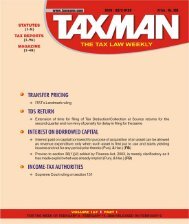CPT V24P7-Art1 (Content).pmd - Taxmann
CPT V24P7-Art1 (Content).pmd - Taxmann
CPT V24P7-Art1 (Content).pmd - Taxmann
You also want an ePaper? Increase the reach of your titles
YUMPU automatically turns print PDFs into web optimized ePapers that Google loves.
used to introduce new rules of law, and the<br />
Act in the latter case will only be amending<br />
the law and will not necessarily be retrospective<br />
(Harding v. Queensland Stamp Commissioners 1898<br />
AC 769 PC). In determining, therefore, the<br />
nature of the Act, regard must be had to the<br />
substance rather than to the form. If a new<br />
Act is to ‘to explain’ an earlier Act, it would<br />
be without object unless construed retrospective.<br />
An explanatory Act is generally passed to supply<br />
an obvious omission or to clear doubts as to<br />
the meaning of the previous Act. It is wellsettled<br />
that if the statute is curative or merely<br />
declaratory of the previous law, retrospective<br />
operation is generally intended. The language<br />
‘shall be deemed always to have meant’ is<br />
declaratory, and is in plain terms retrospective.<br />
In the absence of clear words indicating that<br />
the amending Act is declaratory, it would not<br />
be so construed when the pre-amended provision<br />
was clear and unambiguous. An amending<br />
Act may be purely clarificatory to clear a meaning<br />
of a provision of the principal Act which was<br />
already implicit. A clarificatory amendment of<br />
this nature will have retrospective effect…..”<br />
(pp. 338-339).<br />
6.3 No amendment is pro-tanto constitutionally<br />
invalid due to retrospective effect - No<br />
amendment is pro-tanto constitutionally invalid<br />
merely because it is retrospective. The Federal<br />
Court had examined the norms of a<br />
constitutionally valid provision in the case of<br />
the Governor-General-in-Council v. The Raleigh<br />
Investment Company Ltd. [1944] 12 ITR 265 (FC)<br />
and cited with approval the observation of<br />
Justice Evatt in an Australian tax case – “The<br />
Constitution requires that it must be possible<br />
to predicate of every valid law that it is for<br />
the peace, order and good Government of the<br />
Dominion with respect to a granted subject,<br />
e.g., customs, taxation, external affairs. In such<br />
cases, the presence of non-territorial elements<br />
in the challenged law has to be considered<br />
upon a slightly different footing and those<br />
affirming its validity have to show not only<br />
that the Dominion has some real concern or<br />
interest in the matter, thing, or circumstance<br />
dealt with by the legislation, but that the concern<br />
or interest is of such a nature that the challenged<br />
law is truly one with respect to an enumerated<br />
subject-matter.” Further, constitutional validity<br />
of an enactment can also be challenged before<br />
a court of law, if the enactment infringes the<br />
fundamental rights of the citizens.<br />
6.4 Questions connected with constitutional<br />
validity of declaratory amendments - If the<br />
issue of constitutional validity of these declaratory<br />
amendments is challenged before Court of law,<br />
the following questions may arise – (i) whether<br />
the amendments are really declaratory of the<br />
existing law or a new addition to the existing<br />
law and, hence, should not have retrospective<br />
effect ? (ii) whether the capital gains or other<br />
income arising from the transactions described<br />
in the declaratory amendments have sufficient<br />
territorial nexus with India, so as to make the<br />
income taxable in India in conformity with<br />
constitutional principles, and, hence, whether<br />
the amendment is constitutionally invalid.<br />
6.5 Past amendments to Income-tax Act - In<br />
the past, there have been several examples of<br />
amendments to the Income-tax Act to clarify<br />
or remove deficiencies in the existing law,<br />
exposed by clever tax planning devices adopted<br />
by taxpayers to circumvent a particular taxing<br />
provision, but the reaction of the Revenue has<br />
never been as aggressive as of now. Inclusion<br />
of income arising to the wife and minor children<br />
from the assets transferred by an individual,<br />
in latter’s hands, is one of the earliest specific<br />
anti-avoidance provisions introduced in the<br />
Income-tax Act. It was introduced in the Incometax<br />
Act, 1922 as section 16(3) by the Amending<br />
Act of 1937 (counterpart of section 64 of Incometax<br />
Act, 1961). While as clause (a) of section<br />
16(3) dealt with inclusion of income arising<br />
from assets transferred directly or indirectly<br />
to the wife or a minor child by the individual,<br />
clause (b) dealt with inclusion of so much of<br />
the income of any person or association of<br />
persons as arises from assets transferred to the<br />
person or association by such individual for<br />
the benefit of his wife or a minor child or<br />
August 1 to 15, 2012 u TAXMANN’S CORPORATE PROFESSIONALS TODAY u Vol. 24 u 9<br />
629











![“FORM NO. 3CEB [See rule 10E] Report from an ... - Taxmann](https://img.yumpu.com/45480232/1/190x245/form-no-3ceb-see-rule-10e-report-from-an-taxmann.jpg?quality=85)





